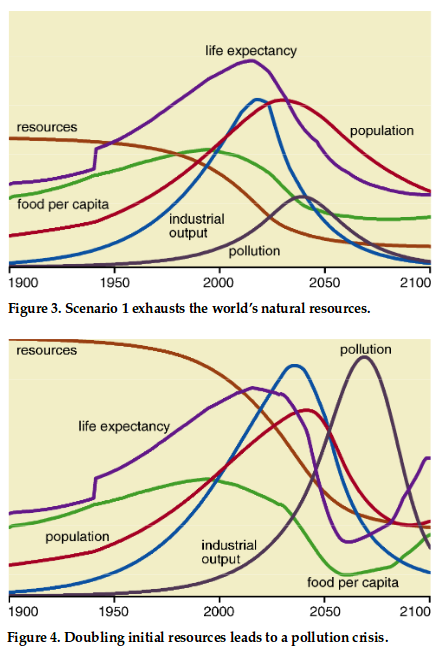Do examples of societies deliberately and successfully lowering their population or economy exist?
If you believe that nonstop growth of the economy and population is impossible on a finite planet, you expect that either we have to stop growing deliberately or nature will cause both to collapse. If you further believe we have have overshot what Earth can sustain, you expect that even if we stop now, nature will cause both to collapse. Growing onto other planets doesn’t help because even if we can grow there, we’d still either have to stop growing here or collapse here.
So if you believe we’ve overshot Earth’s limits, our only path is to degrow, or decrease the size of our economy and, in peaceful, voluntary, noncoercive ways, population.
I think it’s reasonable to ask if it’s possible. To me, it seems possible.
There are plenty of examples of societies thriving without growing. I’ve written about groups like the San bushmen in southern Africe and isolated islands like Hawaii. Lately I’ve been learning about the Hadza in modern Tanzania. We could learn from them, since they’ve thrived up to thousands of times longer than from the Industrial Revolution to now.
But have any deliberately and successfully shrunk in economy or population? Japan is shrinking in population, but I don’t think deliberately. Economists seem only to predict Japan collapsing, but I remember those predictions since their bubble burst in the 1990s, but they keep not collapsing. I don’t see them comparing poorly to, say, the U.S. with our fentanyl, meth, sugar, and fat addictions.
Many places have deliberately lowered their population growth rate, but lowering a growth rate isn’t lowering population.
If our only chance at avoiding collapse is to do something no human society has done before, I think we should be clear and up front about taking on a challenge no one has done before. I’m not sure if it’s more encouraging to say no one has tried so no one has failed or less, or to learn groups have tried but failed.
Ideally, examples exist of successes. I’ve never heard of any. Have you?
If not, again, I think we should clearly state: “We believe we have to do something no humans have tried before. We believe it can work.” I think we can add, “We know not trying will lead to collapse so even if it’s never been tried, we believe it’s our best hope.” Saying it clearly like that instead of what I hear, which is just criticizing “green growth” or capitalism, sounds more appealing.

EDIT: Feedback from experts
I wrote a few population experts who were podcast guests for their views on the question. Among several responses, Alan Weisman wrote back:
Josh, as I discuss in Countdown, several countries, from Mexico to Iran to Thailand — and, of course, China — have deliberately lowered their fertility rate with an aim to lower their population. The problem is, due to population momentum — even with a draconian one-child policy, so many have already been born that it takes two generations before population actually begins to descend (see my Japan chapter: they legalized abortion in 1949, cutting off their baby boom, but only this past decade did their population peak and then begin to drop). Likewise, China’s 1980 one-child policy will finally begin to actually lower population in the early 2030s. Like Japan, the dropoff will then be dramatic.
I know of no country that’s tried to shrink its economy, but I do know of local efforts to simplify economies and supply chains through barter and locally-sourced goods. Again, the Japan chapter features an economist, Akihiko Matsutani, who proposes that down-sizing would bring about a new and better kind of prosperity, as do a handful of other economists, like the two from U. Vermont I cite in that chapter, or Herman Daly. But they’re still a tiny minority. The only way that both population and economic growth are going to come down rapidly is when they’re brought down — by weather disruption, disease, toxins, famine, wars, marine acidification… I think you get the picture. Â
What he wrote was consistent with what others did: Several nations have promoted lower growth rates, but not full degrowth. Alan clarified the huge challenge of the time lag between action and results. I have to learn more about population momentum. One TEDx talk shows it with blocks, but I should learn the math.
I recommend Countdown if you haven’t read it. It enabled me to talk about population, not just viewing it as a taboo subject. Now it feels shocking that adults can’t bring the subject up, and that people get stuck thinking it’s racist or sexist. They’re thinking of something else, some stereotype or misunderstanding.
Read my weekly newsletter

On initiative, leadership, the environment, and burpees